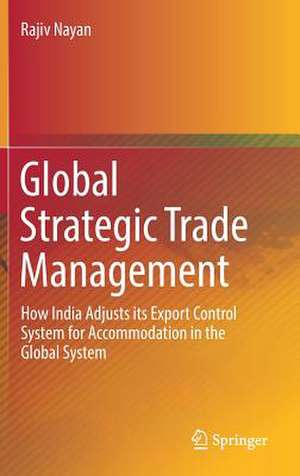Global Strategic Trade Management: How India Adjusts its Export Control System for Accommodation in the Global System
Autor Rajiv Nayanen Limba Engleză Hardback – 6 mar 2019
The book also describes the mechanisms India is adopting in this regard. It demonstrates the shift in the Indian approach to strategic trade management, from an outspoken critic to a supporter. Politically, the country was initially skeptical of the idea of export controls because it was a target of such systems. The book also explains the tools, forces and incentives that moved India to adapt its policy on export controls or strategic trade management.
Preț: 728.28 lei
Preț vechi: 888.14 lei
-18% Nou
Puncte Express: 1092
Preț estimativ în valută:
139.36€ • 151.85$ • 117.43£
139.36€ • 151.85$ • 117.43£
Carte tipărită la comandă
Livrare economică 23 aprilie-07 mai
Preluare comenzi: 021 569.72.76
Specificații
ISBN-13: 9788132239246
ISBN-10: 8132239245
Pagini: 198
Ilustrații: XV, 186 p. 2 illus.
Dimensiuni: 155 x 235 x 18 mm
Greutate: 0.46 kg
Ediția:1st ed. 2019
Editura: Springer India
Colecția Springer
Locul publicării:New Delhi, India
ISBN-10: 8132239245
Pagini: 198
Ilustrații: XV, 186 p. 2 illus.
Dimensiuni: 155 x 235 x 18 mm
Greutate: 0.46 kg
Ediția:1st ed. 2019
Editura: Springer India
Colecția Springer
Locul publicării:New Delhi, India
Cuprins
Introduction.- Chapter 1. Global Best Practices.- Chapter 2. Comparing the Major Systems.- Chapter 3. Philosophy of Indian Strategic Trade Management.- Chapter 4. Legal Framework.- Chapter 5. Regulatory Framework.- Chapter 6. Enforcement System.- Chapter 7. International Cooperation.- Conclusion.
Notă biografică
Rajiv Nayan is a Senior Research Associate at the Institute for Defence Studies and Analyses, New Delhi, India. He has been working with the Institute since 1993, where he specializes in international relations, security issues, especially the politics of nuclear disarmament, export control, non-proliferation, and arms control. Rajiv was a Visiting Research Fellow at Japan Institute of International Affairs, Tokyo, where he published his monograph, ‘Non-Proliferation Issues in South Asia’. He was also Senior Researcher at Peace Research Institute, Oslo, a Senior Visiting Research Fellow at King’s College London, and a Visiting Fulbright Scholar at the Center on International Cooperation, New York University. He holds a PhD and a Master of Philosophy in Disarmament Studies and a Master of Arts in International Relations from Jawaharlal Nehru University, New Delhi. In his doctoral dissertation, he studied implications of the missile technology control regime for Indian security and economy.
Nayan is an Indian partner of Fissile Materials Working Group (FMWG) which is a Washington-based group of Non-Governmental Organisations active on nuclear security. He is a member of expert-level committees of organizations such as the Ministry of Defence and the Indian Council of Social Sciences Research. He is on the Advisory Council of Delhi School of Transnational Affairs, University of Delhi. He is a member of Governing Council/Society of the Maulana Abul Kalam Azad Institute of Asian Studies. Additionally, Nayan was a Member, Regional Network of Strategic Studies Centers Weapons of Mass Destruction/Border Security Working Group, a member of the governing council of the International Export Controls Association, hosted by University of Georgia in Washington, DC, and a member of the Export Controls Experts Group and Multilateral Security Governance in Northeast Asia/North Pacific of the Council for Security Cooperation in Asia Pacific (CSCAP).
Nayan is an Indian partner of Fissile Materials Working Group (FMWG) which is a Washington-based group of Non-Governmental Organisations active on nuclear security. He is a member of expert-level committees of organizations such as the Ministry of Defence and the Indian Council of Social Sciences Research. He is on the Advisory Council of Delhi School of Transnational Affairs, University of Delhi. He is a member of Governing Council/Society of the Maulana Abul Kalam Azad Institute of Asian Studies. Additionally, Nayan was a Member, Regional Network of Strategic Studies Centers Weapons of Mass Destruction/Border Security Working Group, a member of the governing council of the International Export Controls Association, hosted by University of Georgia in Washington, DC, and a member of the Export Controls Experts Group and Multilateral Security Governance in Northeast Asia/North Pacific of the Council for Security Cooperation in Asia Pacific (CSCAP).
Textul de pe ultima copertă
This book examines whether India is successfully integrating and adapting to the global strategic management system. It offers essential insights into the evolution of export controls for goods, which may have implications for the development of Weapons of Mass Destruction – an aspect that is especially relevant given India’s robust biotechnological, chemical and nuclear industrial base. In security studies, the phrase “strategic trade management” is now slowly replacing the phrase “export control”. However, for the policymaking community, export control remains popular, at least for the sake of reference.
The book also describes the mechanisms India is adopting in this regard. It demonstrates the shift in the Indian approach to strategic trade management, from an outspoken critic to a supporter. Politically, the country was initially skeptical of the idea of export controls because it was a target of such systems. The book also explains the tools, forces and incentives that moved India to adapt its policy on export controls or strategic trade management.
The book also describes the mechanisms India is adopting in this regard. It demonstrates the shift in the Indian approach to strategic trade management, from an outspoken critic to a supporter. Politically, the country was initially skeptical of the idea of export controls because it was a target of such systems. The book also explains the tools, forces and incentives that moved India to adapt its policy on export controls or strategic trade management.
Caracteristici
Provides a detailed study on export controls for sensitive items in India Discusses India’s bilateral and multilateral cooperation regarding export controls Focuses on the evolution of Indian control systems, examining them from the perspective of global best practices for strategic trade management
